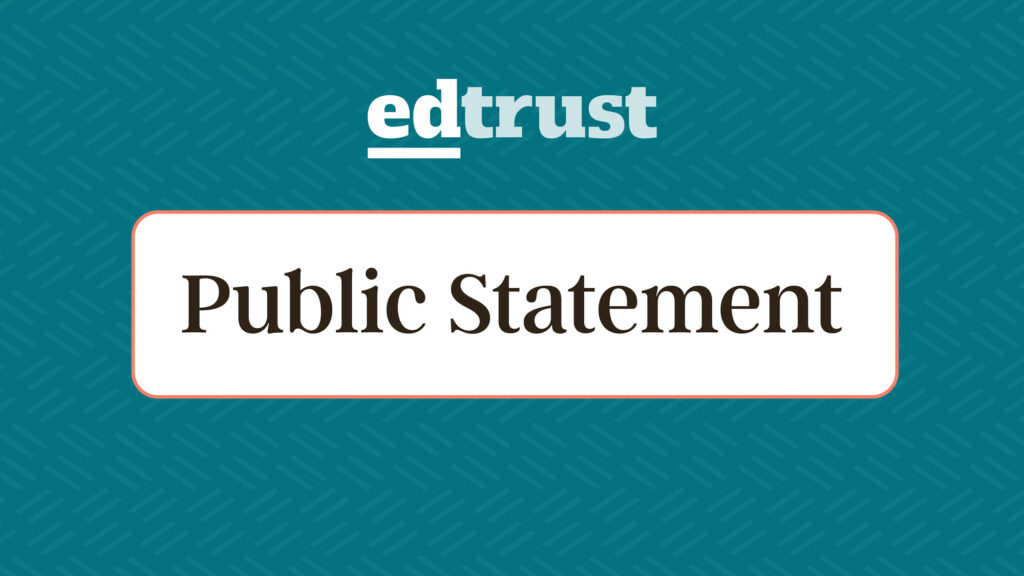Addressing Inequities in State Financial Aid: A Call to Action for Equitable Access to Higher Education
EdTrust’s report examines state financial aid programs and calls on state and policy leaders to prioritize equity to ensure that more students can afford college.

April 04, 2024 by
EdTrust
For Immediate Release
Contact:
Andrea Ramirez
aramirez@edtrust.org
EdTrust’s report examines state financial aid programs and calls on state and policy leaders to prioritize equity to ensure that more students can afford college
WASHINGTON— Between the skyrocketing cost of college and declining enrollment, higher education is due for a massive overhaul. Millions of students are forced to make tough decisions about their future while questioning the value of college, mainly due to sticker shock and lack of funding support. The public fiasco with this year’s FAFSA has made it even more challenging for students to access financial aid – especially low-income, first-generation, students of color, and students from diverse backgrounds – underscoring the urgent need for equitable access to state financial aid.
In a comprehensive new report, Who Deserves State Financial Aid? Eligibility Criteria for Students Entering College, EdTrust delves into the eligibility criteria of state financial aid programs across 10 states. Our analysis reveals that many state financial aid programs present formidable obstacles to underserved students.
EdTrust states that the eligibility criteria for state financial aid must be scrutinized and addressed to ensure fairness and accessibility and lists several ways that state financial aid programs are not equitable, such as merit-based aid being prioritized over need-based aid, non-traditional students being excluded, stringent income eligibility, skewed standardized testing barriers, and the lack FAFSA support.
“College provides one of the surest paths for people to pursue a job that allows for social mobility for themselves and their family,” said Wil Del Pilar, Ph.D., EdTrust’s senior vice president. “However, due to the inaction of state leaders to prioritize equity in their financial aid programs, the high cost of going to college cast shadows on the dreams of countless aspiring students. State leaders are key to unlocking equitable access to higher education by reforming financial aid programs. It’s time to press for pathways to success, ensuring that the promise of college is not a privilege reserved for the few but a real option for all.”
For this analysis, researchers examined policies in states where EdTrust has an established presence, including California, Illinois, Louisiana, Massachusetts, Michigan, New York, Ohio, Tennessee, Texas, and Washington. The report offers six recommendations that will ensure that financial aid is allocated equitably and based on a comprehensive understanding of a student’s true financial need:
- Prioritize access to state need-based aid
- Increase award amounts
- Explore new methods for determining financial need
- Prioritize state financial aid alternative application processes
- Make state financial aid available to students attending less than full-time
- Standardize “Student Aid Offers”
The report also highlights bright spots where state leaders have centered access to education for traditionally underserved students, including undocumented students and justice-impacted students. EdTrust notes that these efforts have been driven by a recognition that education is essential for social and economic mobility and that all students should have access to the resources necessary to pursue their academic goals. For example:
- Massachusetts enacted legislation through their FY2024 Budget allotment to open state financial aid access to undocumented students. California, New York, Texas, and Washington have alternative financial aid applications for undocumented students.
- In California, the CA Dream Act Application allows undocumented students interested in attending eligible California colleges, universities, and career education programs to apply for state financial aid.
- In Texas, the Texas Application for State Financial Aid (TASFA) collects information to help determine eligibility for state financial aid programs for Texas resident students who cannot apply for financial aid using the FAFSA.
- In New York, the New York State Excelsior Scholarship, provides tuition-free assistance to New York residents attending eligible public colleges and universities, and Washington’s College Grant do not exclude justice-impacted students from accessing financial support. This is significant because removing barriers to state financial aid access and affordability for justice-impacted students helps to create more equitable pathways to higher education attainment.
“Our call to action extends to state policymakers, urging them to consider the transformative power of education in building a more just and inclusive society,” said Del Pilar. “By making state financial aid more accessible, we can dismantle systemic barriers and ensure all students, especially those who struggle the most to pay for college, have fair access to higher education opportunities.”
###
About EdTrust
EdTrust is committed to advancing policies and practices to dismantle the racial and economic barriers embedded in the American education system. Through our research and advocacy, EdTrust improves equity in education from preschool through college, engages diverse communities dedicated to education equity and justice, and increases the political and public will to build an education system where students will thrive.
Related

June 16, 2025 by
EdTrust
On behalf of EdTrust, a national nonprofit committed to advancing policies and practices to dismantle the racial and economic barriers embedded in the American education system, thank you for the opportunity to present testimony on the Fiscal Year 2026 (FY26) Labor, Health and Human Services, Education, and Related Agencies (L-HHS-ED) Appropriations bill.

May 13, 2025 by
EdTrust
Statement from Denise Forte, president and CEO of EdTrust, on budget reconciliation

November 25, 2024 by
EdTrust
EdTrust applauds the Department of Education for proposing two pathways for waiving some or all of the outstanding balance of a federal student loan held by the Department.






 June 16, 2025 by
June 16, 2025 by 
